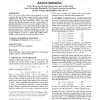Free Online Productivity Tools
i2Speak
i2Symbol
i2OCR
iTex2Img
iWeb2Print
iWeb2Shot
i2Type
iPdf2Split
iPdf2Merge
i2Bopomofo
i2Arabic
i2Style
i2Image
i2PDF
iLatex2Rtf
Sci2ools
PEWASUN
2004
ACM
2004
ACM
A performance evaluation framework for IEEE 802.11 ad-hoc networks
Interferences in an ad-hoc network can be defined as a set of constraints that specify which groups of nodes cannot transmit simultaneously, and they have significant implications for the network capacity and other performance measures. This paper expounds the difference between two types of interferences: 1) physical interferences due to the receiver’s inability to decode a signal when the powers received from other signals are large; and 2) protocol interferences imposed by the specific multi-access protocol being used to coordinate transmissions of nodes. We model interference types 1 and 2 in terms of graphs. Based on the insights obtained, we devise a scheme that modifies 802.11 slightly to make its capacity scale with the number of nodes. Categories and Subject Descriptors C.4 [Performance of Systems]: Modeling techniques General Terms Measurement, Performance, Algorithms. Keywords Wireless Networks, Ad hoc Networks, IEEE 802.11, Performance Analysis, Capacity, Scalable Perfor...
PEWASUN 2004 | Physical Interferences | Protocol Interferences | Specific Multi-access Protocol | Wireless Networks |
Related Content
| Added | 30 Jun 2010 |
| Updated | 30 Jun 2010 |
| Type | Conference |
| Year | 2004 |
| Where | pewasun |
| Authors | Ping Chung Ng, Soung Chang Liew, Li Bin Jiang |
Comments (0)

